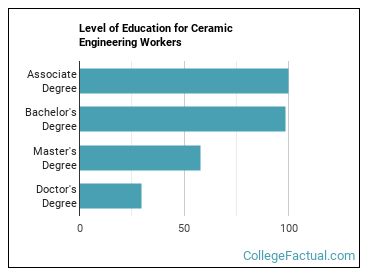Ceramic engineering programs offered by schools range from a bachelor s to a research scholarship based doctorate which is the highest ceramic engineering degree you can get.
What does a ceramic engineer do.
For example many are involved in research and development.
Civil engineering for example includes structural and transportation engineering and materials engineering includes ceramic metallurgical and polymer engineering.
Many engineering applications benefit from ceramics characteristics as a material.
Although many ceramics engineers work in the aerospace industry others find jobs in electronics or medicine.
They develop new ceramic materials synthetically or from minerals found in the earth.
Career options and requirements.
This information helps the researcher determine how and where products can be used and what kinds of design modifications might be necessary to make a product more useful.
This is done either by the action of heat or at lower temperatures using precipitation reactions from high purity chemical solutions.
The time it takes to complete a ceramic engineering degree varies depending on the program.
Engineers also may specialize in one industry such as motor vehicles or in one type of technology such as turbines or semiconductor materials.
The term includes the purification of raw materials the study and production of the chemical.
Ceramic engineers develop ceramic materials and the processes for making them into useful products from high temperature rocket nozzles to glass for lcd flat panel displays.
Ceramic engineering is the technology of manufacturing and usage of ceramic materials.
Some ceramic engineers teach and do research in universities.
The society was founded 115 years ago to meet the professional needs of those who worked on ceramic and glass materials.
Ceramic engineering is the science and technology of creating objects from inorganic non metallic materials.
In the united states for example most ceramic engineering and metallurgy programs have been absorbed into materials science and engineering departments.
However ceramic engineering programs are not.
For an entry level job in ceramic engineering and technology you need to earn a bachelor s degree in ceramic engineering or materials science.
Ceramic engineers are also supervisors in factories and may advance to a variety of managerial and sales positions.
Ceramic engineers often specialize in one type of work.
Composites engineers develop materials with special engineered properties for applications in aircraft automobiles and related products.
A ceramic engineer can perform testing to learn about the chemical physical and electrical properties of ceramic compounds and finished products.
Others work for government agencies and research centers.


















